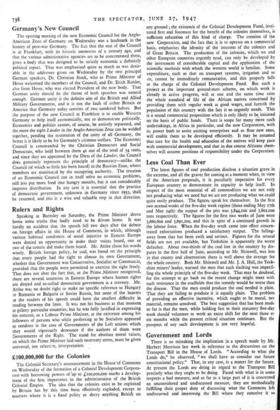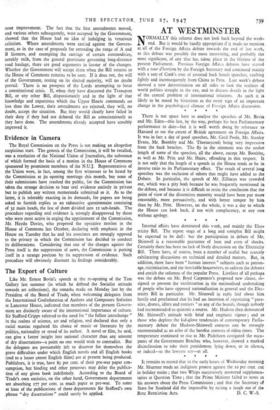Government and Lords
There is no mistaking the implication in a speech made by Mr. Herbert Morrison last week in reference to the discussions on the Transport Bill in the House of Lords. "According to what the Lords do," he observed, "we shall have to consider our future constitutional policy." That, in any case, is a matter for the future. At present the Lords are doing in regard to the Transport Bill precisely what they ought to be doing. Faced with what is in some respects a bad measure, and so far as a large part of it is concerned an unconsidered and undiscussed measure, they are methodically fulfilling their proper duty of discussing what the Commons left undiscussed and improving the Bill where they conceive it to need improvement. The fact that the first amendments moved, and various others subsequently, were accepted by the Government, showed that the House had no idea of indulging in vexatious criticism. Where amendments were carried against the Govern- ment, as in the case of proposals for extending the range of A and B licences, and exempting the carriage of certain commodities, notably milk, from the general provisions governing long-distance road haulage, there are good arguments in favoUr of the changes. Whether the Government will accept them when the Bill returns to the House of Commons remains to be seen. If it does not, the will of the Government, resting on its elected majority, will no doubt prevail. There is no prospect of the Lords attempting to force a constitutional crisis. If, when they have discussed the Transport Bill, or any other Bill, dispassionately and in the light of that knowledge and experience which the Upper House commands no less than the Lower, their amendments are rejected, they will, no doubt, accept the situation. But they would clearly have failed in their duty if they had not debated the Bill as conscientiously as they have done. The amendments already accepted have sensibly improved it.



































 Previous page
Previous page